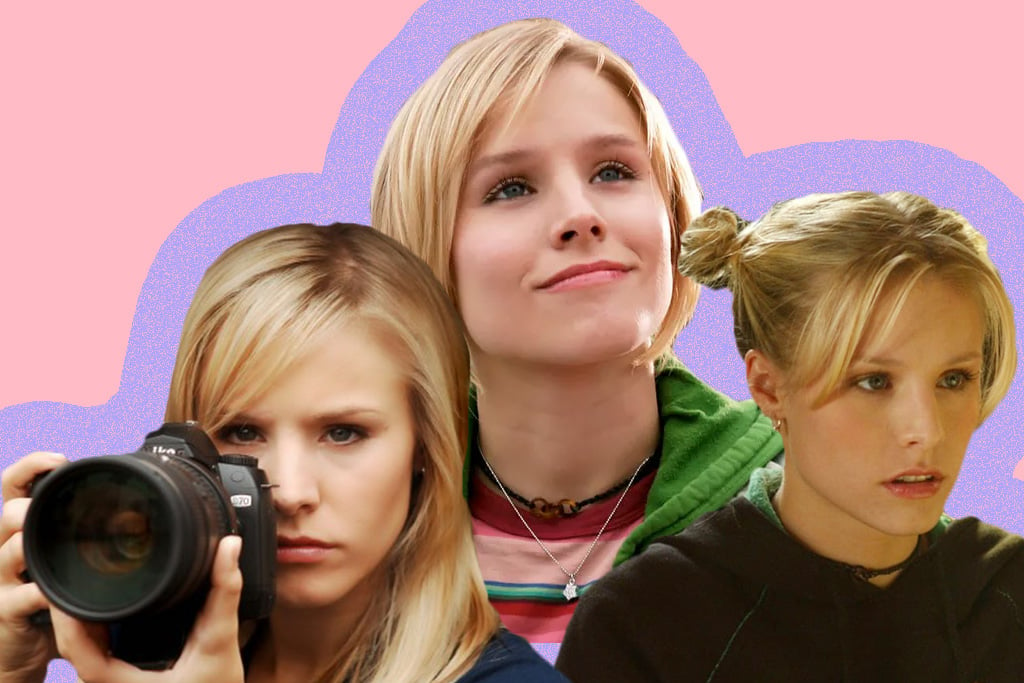I Rewatched Season 1 Of ‘Veronica Mars’ And It Made Me Appreciate The New Series Even More
Veronica Mars is all grown up, and that's ok!

It’s been fifteen years since the first season of Veronica Mars aired.
*This article only has very minor spoilers for season 4*
The first season of that show needs to be acknowledged as one of the tightest, freshest, and most compelling seasons of TV ever made.
How can Neptune be at once something goofy, and boppy and teen, and also a bleakly depressing comment on class? How can a brutal murder mystery nestle so flawlessly primarily within a high school setting? How did they manage to make Veronica the most compelling character on TV?
It’s also worth watching, if only to compare, contrast, and understand the controversial new season.
Veronica Mars season 4 seems to be another symptom of our current mania for reviving nostalgic classics of television — everything from reboots of Charmed to limited continuations of beloved stories, like with Gilmore Girls: A Year In The Life.
Do we really need to revisit Neptune, and find out what a nearly 40-year-old Veronica is up to? Do we need to dramatise the life of someone who’s been through so much (including a very rough third season)? Did we TRULY need that distressing ending?
People seem conflicted about all of this — but Veronica Mars season 4 is an incredibly different beast than season 1. And that’s such a necessary thing.
And we shouldn’t be surprised that Veronica Mars ends this season on tragedy, on learning that nobody ever truly gets a happy ever after.
This Is Not Your Grandparent’s Veronica Mars
Veronica Mars season 4 is dark.
It has moments of violence, gunfights, fistfights, and a casual brutality that we only saw hints of in earlier seasons. The plot is both more immediate — halting a serial bomber, but also less personal than Lily Kane’s murder, or the bus crash from season 2, in that Veronica Mars is really only professionally involved in the crime.
It’s more adult too: our protagonists have moved beyond high school drama.
But that’s precisely what makes this show darker, even though the show has never been particularly light. It’s always dealt with the dark underside of humanity. It’s always been bold enough to tackle things like Veronica Mars’ sexual assault in non-euphemistic ways (although season 3 had some swings and misses in this regard).
Instead it’s the pall of adulthood that lies so strongly across everyone that shadows this new season — there’s a loss of innocence. There’s a loss of hope. And it’s what replaces it that makes the show feel more grim.
“I thought that’s what we’re all learning — nothing matters” she says in a voiceover in the first episode of season 4.
Yes I did just watch all 8 episodes of #VeronicaMarsSeason4 and I don’t want to talk about it. But I just want to say that Veronica pouring this glass of wine was the most relatable thing I’ve ever seen on TV. pic.twitter.com/SFkW546tGi
— Alyssa Carlson (@alyssacarlsonAC) July 21, 2019
Veronica Mars Hasn’t Aged A Day, Except Emotionally
From the beginning of the season, we’re not allowed to feel comfortable with Veronica being back in Neptune. They take the inherent danger of reviving an iconic show and twist it into a plot point.
They make us question the reasons she’s back, and never let us just be happy that things are “back to normal”, and that she’s solving crimes with her old dad again, just like we remember. In fact, it becomes a point of tension, a jag that never lets us sink into nostalgia.
Even though we’re given plenty of callbacks for the fans — her iconic camera, guest visits from all the boyfriends, little easter eggs from the first series — they very clearly try to point out that things are different from season 1.
Most specifically, Veronica Mars herself is different. There’s still fun, levity, and trademarked quips.
She’s always been an interesting, complex character — in season 1 in particular, we overlook her hardness, her vindictiveness, because she weaponises it in pursuit of justice. It’s also justified, she’s been through a lot!
“You don’t develop a keen sense of mercy” she says at one point. And it’s true — Veronica Mars in season 4 has stopped even pretending to be merciful.
In this season, we are served a Veronica Mars steeped in the consequences of a life with such a pointed, somewhat spiteful outlook on life. We are given a Veronica Mars who has dealt with the consequences of decades of grief and trauma. It’s very real and important writing — but it doesn’t make it necessarily palatable.
I definitely wanted better for Veronica Mars as a person.
Current status of the Veronica Mars fandom after watching S4:
#VeronicaMars #VeronicaMarsSeason4 #marshmallows #LoVe pic.twitter.com/YeNQ3Pvjcy
— Julie Johnson (@AuthorJulie) July 20, 2019
Remembering Veronica Mars Season 1
What strikes me as the main difference, the integral comparison between season 1 and season 4 is the structure of the average episode of Veronica Mars.
Veronica is beyond busy, manically multi-tasking hours of different activities into a tight 45 minute episode.
In a single episode, she could be taking on a new, monster of the week style case (finding a classmate’s father, busting open a cyber-bullying ring, solving a dognapping case), while at the same time scamming the sheriff’s department for clues on her best friend’s death, trying to track down her absent mother, AND discover the details of her own sexual assault.
If that wasn’t enough, she’d also be navigating several fairly hot relationships (although Duncan Kane can suck a fart), new friendships, social ostracisation, big academic dreams, money troubles, the fact that her dad is a town pariah… the list goes on.
It’s not only her energy and dedication to all these pursuits that make Veronica our hero, an icon, a force of nature — it’s the motivation behind it. She believes that she can fix these problems with sweat and wits and gumption, AND punish wrongdoers. It’s satisfying to watch her deal out both justice and revenge. It’s brilliant to watch her catch the bad guy.
We lose that sense of purpose and that energy, that kaleidoscope of plots in season 4.
Veronica is an adult now, who solves crimes for a living. Her motivation is extremely different from season 1, her methodology changed. The episodes are paced in an entirely different way to reflect this. She doesn’t go to high school. She catches bad guys for different reasons.
Her relationships are either settled — she seems to barely tolerate middle-class Wallace and his children — or artificially inflamed, like when she goads Logan into losing his temper purely so she can get a reaction, some excitement, some hot sex.
“When your friend was murdered, were you angry?” she’s asked in season 4.
“I’m still angry” she answers — this show is about a woman who’s been angry for 15 years.
This all makes brutal, perfect character sense.
So Kristen Bell said that she's willing to keep doing the show until all will be dead in Neptune? I think it's time to drop a bomb on that fictional city and kill all. After this Veronica Mars has no furore. Screw the writers and the producers and hulu. #VeronicaMarsSeason4
— Xenia (@Xenia_syssi) July 20, 2019
Fake Veronica
Perhaps the avatar of this shift between seasons is the character of Maddy, the ham-fisted attempt at creating a new, teen Veronica Mars protege.
But what an upsetting simulacra, what a dead-eyed, soulless replica? Maddy isn’t given the time or the development to even get near to being as compelling as Veronica, and this idea that another Veronica can be forged in tragedy is weird and shortsighted.
Veronica was defined by the unique pressures of the Neptune around her in season 1: Nu-Veronica spends most of her time isolated in an abandoned motel, peerless, charmless and too removed from the narrative to have an effective motivation. Luckily, she’s really only a distraction, and doesn’t take too much from the plot.
We don’t need another young Veronica, because the adult version of her is already haunted by her younger self, still suffering from choices her teen self made.
all I can say after #VeronicaMarsSeason4 is that my heart is now a cemetery of dead hopes and dreams. Thank you, #hulu, thank you. Rip to happy endings.
— Ellie Schrier (@ellierose270) July 20, 2019
That Fucking Ending
But maybe the characters we love don’t deserve to be ripped from their TV graves, to perform for us again.
I want to clarify that I loved Veronica Mars season 4 — I thought there were some really weird moments, some odd choices, some very cringe exploration of youth terminology. But mostly, I fucking enjoyed it, and thought that the writing did justice to the character and the world.
That doesn’t mean it’s fair — but it is justice. I loved being back in Neptune, solving crimes, and there’s joy and wit aplenty to be found.
As you’re probably aware, fans are outraged at the end, a real classic moment of snatched happiness for a character who has already suffered so much. They’re up in arms, they’re angry. They’re fucking spewing.
Wow. 15 years, a Kickstarter movie (which I supported on its very first day), and I don't think I'll ever watch another minute of Veronica Mars. Ever. I'm not being hyperbolic when I say that ending felt like a betrayal. Way to say "Cuss You" to the fans. #VeronicaMarsSeason4
— Hallie Smith (@evilwhitecat) July 19, 2019
But, and I stress this, it’s our fault. When our collective desires as fans perform network television necromancy, and raise a beloved character from the dead, for a revival or a reboot or a new series, we are placing them once again on the merciless rack of narrative.
Veronica Mars, as a character, suffers.
We’ve seen that — it’s built in the genes of how her story is written. If we wanted to spare her further pain, if we’re outraged at burdening her with new and terrible losses… then maybe we should have just left her alone, and rewatched season 1.
Me after the ending #VeronicaMars #VeronicaMarsSeason4 pic.twitter.com/Y8i68JbKwo
— Emily 🐾❄️🌨 (@winternights101) July 20, 2019
Veronica Mars season 4 is currently streaming on Stan.
Patrick Lenton is the Entertainment Editor at Junkee. He tweets @patricklenton.
